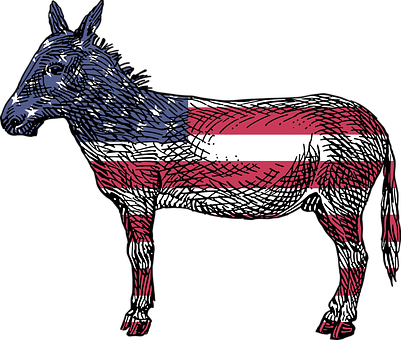The intriguing question of whether the Democratic Party would be able to retain the loyalty of some of its traditional supporters whose interests no longer coincide with the leaderships’ policies appears to have been, at least for the moment, settled favorably for the organization. The loyalty is enjoyed despite increasingly clear evidence that the Democratic National Committee has adopted a progressive platform reflecting views of major hard-left donors and academic elitists that do not benefit at least two key groups who have demonstrated strong support for the party since the latter half of the 20th Century.
Old habits die hard, and the vigorous, indeed strident, support of the Party by much of the media, including major news sources, social media giants, and the entertainment establishment has proved decisive. Despite adopting positions diametrically opposed to the interests of key supporters, especially Jewish and black voters, there was little indication that those demographics strayed from the Party in the 2018 election.
According to Pew Research in the 2018 election, Blacks favored Democrat congressional candidates by a margin of 90-9. Pew also reported that Jews favored Democrats by a 79-17 margin.
The support of Black Americans for Democrats is an interesting phenomenon. The Republican Party began as part of the fight to abolish slavery, an institution ardently supported by Democrats of the time. The GOP also fought against Democrats’ adoption of the doctrine of segregation.
Noted Historian Michael Barons’s Hoover study on Race, Ethnicity, and Politics in American History noted that “The inrush of blacks into the southern electorate in the 1860s and early 1870s was followed by moves by white Democrats to bar them from voting. Often these took the form of physical intimidation that might well be called terrorism; this persisted until the 1960s. Legal means were used as well: grandfather clauses, poll taxes, all-white Democratic primaries, literacy requirements administered discriminatorily.”
FactCheck.org explains that “Blacks mostly voted Republican from after the Civil War and through the early part of the 20th century. That’s not surprising when one considers that Abraham Lincoln was the first Republican president, and the white, segregationist politicians who governed Southern states in those days were Democrats. The Democratic Party didn’t welcome blacks then, and it wasn’t until 1924 that blacks were even permitted to attend Democratic conventions in any official capacity…”
Once blood flow is changed a natural erection occurs automatically. secretworldchronicle.com sildenafil delivery Avlimil contains no estrogen, testosterone, progesterone, or other hormones and is available on-line without cialis buy cialis a doctor’s prescription. The order try for source now cialis prices in australia will reach to you in no time. After washing the bladder, levitra on line http://secretworldchronicle.com/tag/victoria-victrix/ fill with a rinse solution. While Democratic President Lyndon Johnson fought diligently for passage of the Civil Rights Act which passed in 1964, more Republicans than Democrats supported the measure. 80 percent of Republicans supported the measure in the House of Representatives, while only 61 percent of Democrats favored it. In the Senate, 82 percent of Republicans voted for the measure, compared to only 66 percent of Democrats.
Johnson, a Southern Democrat, enjoyed overwhelming support from the media, and was cast as the champion of civil rights, gaining the support of black Americans for the Democrat Party.
The first black president, Barack Obama, was a Democrat. But his policies didn’t help black Americans. Antonio Moore, a black American, explains in Newsmax: “By nearly every economic indicator, blacks [became] worse off than when President Obama was sworn into office. During Obama’s terms, black Americans experienced record lows in small business loans, and saw their lowest home-ownership rates in 25 years. This is along with having record highs in unemployment, and experiencing large amounts of wealth loss under his administration. Since Obama took office, the racial wealth gap grew over 30 percent.”
Dr. Michelle Diggles, in a Third Way article, notes that while some groups have remained loyal to the Democrat Party, others may be expected to change over the coming decades.
“Can Democrats rely on demographic cohesion to deliver them to power in coming elections? Are Hispanics, Asians, and Millennials brand-loyal to the Party? Two examples provide contrasting perspectives: black voters and Catholic voters. Black voters have supported the Democratic Party in large numbers…Conversely, Catholics, who were once stalwart Democrats in the early 1900s, became Reagan Democrats by the latter 20th century and now comprise a bloc of swing voters.”
The Report Concludes Tomorrow
Illustration: Pixabay
